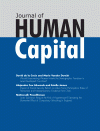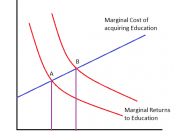Human Capital is the stock of enterprise accumulated by a worker to enhance future productivity. In order to create this, investment is needed in education and training. A broad interpretation of human capital can be taken by including improvements in nutrition, health and housing as contributing factors in increasing human capital. In economic jargon it is said, spending to increase the stock of human capital should be viewed as investment and not as consumption demand.
In terms of analysing the benefits in investing in human capital, the costs of this have to be taken in to consideration through direct costs of paying for tuition fees but also indirect costs of delaying paid employment for extra years in education. Generally, the human capital theory, delivers economic benefits to the individuals through higher wages therefore groups of individuals (the nations) should be also able to see the effects. Young healthy people without higher education can work hard and earn good money but cannot look forward to steadily rising wages.
On average by the age of 30, their wages will have peaked. Whereas the higher educated individuals start at wages only slightly above the unqualified but face rising incomes over their life due to experience in the field.
Compared to countries such as Japan and Germany, the UK has a poor record with both education and training. For example recent studies have shown the UK in secondary education maths are behind other countries such as a year behind Holland, Belgium and France and 2 years behind Japan. Also recent research has shown an extra two years in school i.e. A levels does not add much to the lifetime earnings as those leaving school at 16. Showing at only 6% higher. These are some of the reasons why government intervention is needed. It also...


